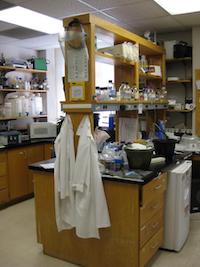
The basic science research laboratories of the Department of Dermatology are located near the Duke Dermatology clinic and the Levine Science Research Center. Our research interests are directed to address skin diseases of connective tissue, epithelial tissue and dermatological immune disorders. We use cutting edge technologies to tackle specific questions at the genetic, epigenetic and protein levels.

The laboratory of Dermatoimmunology is under the direction of Dr. Russell Hall. This laboratory is interested in the pathophysiology and molecular biology of the blistering diseases including dermatitis herpetiformis, cicatricial pemphigoid, and bullous pemphigoid and pemphigus. Studies are currently underway characterizing the mucosal immune response in patients with dermatitis herpetiformis including the patterns of cytokine and inflammatory cell activation in the skin, gut and circulation that occur in response to ingestion of wheat protein. Dr. Hall's laboratory is also investigating the pathogenesis of the auto-immune blistering diseases bullous pemphigoid and pemphigus vulgaris. These studies are directed at understand the antigenic specificity of auto-antibodies and correlation with clinical disease activity and understanding the role of B cells in the generation and maintenance of auto-antibodies. Mechanistic studies that are linked to clinical trials utilizing new therapies including rituxan and infliximab in the treatment of these diseases are ongoing.
Dr. Fang Li's lab focuses on two main research areas: 1) the roles of cell death factors, including caspases and necroptotic factors, and 2) novel cell signaling pathways in tumor growth and their impacts on targeted therapy, chemotherapy, or radiation therapy. The goal is to uncover insights that can drive the development of innovative immunotherapeutic strategies and new approaches to enhance immune checkpoint blockade (ICB) therapy, radiotherapy, as well as targeted therapy and chemotherapy.
The laboratory of Dr. Terry Lechler is studying the morphogenesis of epithelia in the skin and intestine, two highly proliferative tissues, with focus on spindle orientation/asymmetric cell division in the epidermis, regulation of centrosomes and microtubule organization, and cell-cell adhesion. The lab studies the cell biology of how mitotic spindle positioning is controlled, how these divisions are regulated developmentally and the consequences of loss of spindle orientation on tissue development, homeostasis and regeneration. The lab is also studying both how centrosomal and non-centrosomal microtubule arrays are formed in cells, using genetics to understand the functions of these arrays, and determining how differentiation signals impact the composition and function of centrosomes and microtubules. Finally, the lab studys cell adhesion structures including adherens junctions, tight junctions and desmosomes and their interplay with underlying cytoskeletal structures.
The central goal of Dr. Oh's Lab is to develop microbiome therapeutics to treat human diseases. Diverse tools like genomics and synthetic biology are used to investigate our microbiome’s role in our health and engineer therapeutics. The long-term goal of this research program is to create new microbiome-based therapeutics for skin disease, with implications for a wide range of inflammatory diseases.
The laboratory of Skin Biology and Cancer Biology is under the direction of Dr. Jennifer Zhang. This laboratory uses cell culture, 3D organotypic skin culture, and de novo regenerated skin models, as well as genetic animal models to study 1) genetic regulatory mechanisms governing epithelial proliferation, differentiation and carcinogenesis, 2) keratinocyte-immune cell crosstalk during wound healing and regeneration process of the skin, and 3) signaling networks important for melanoma growth and response to therapy. We are especially interested in understanding how K63-ubiquitination and NF-kB, AP1, and clock family gene regulators control epidermal morphogenesis, innate immune function, and cancer progression.